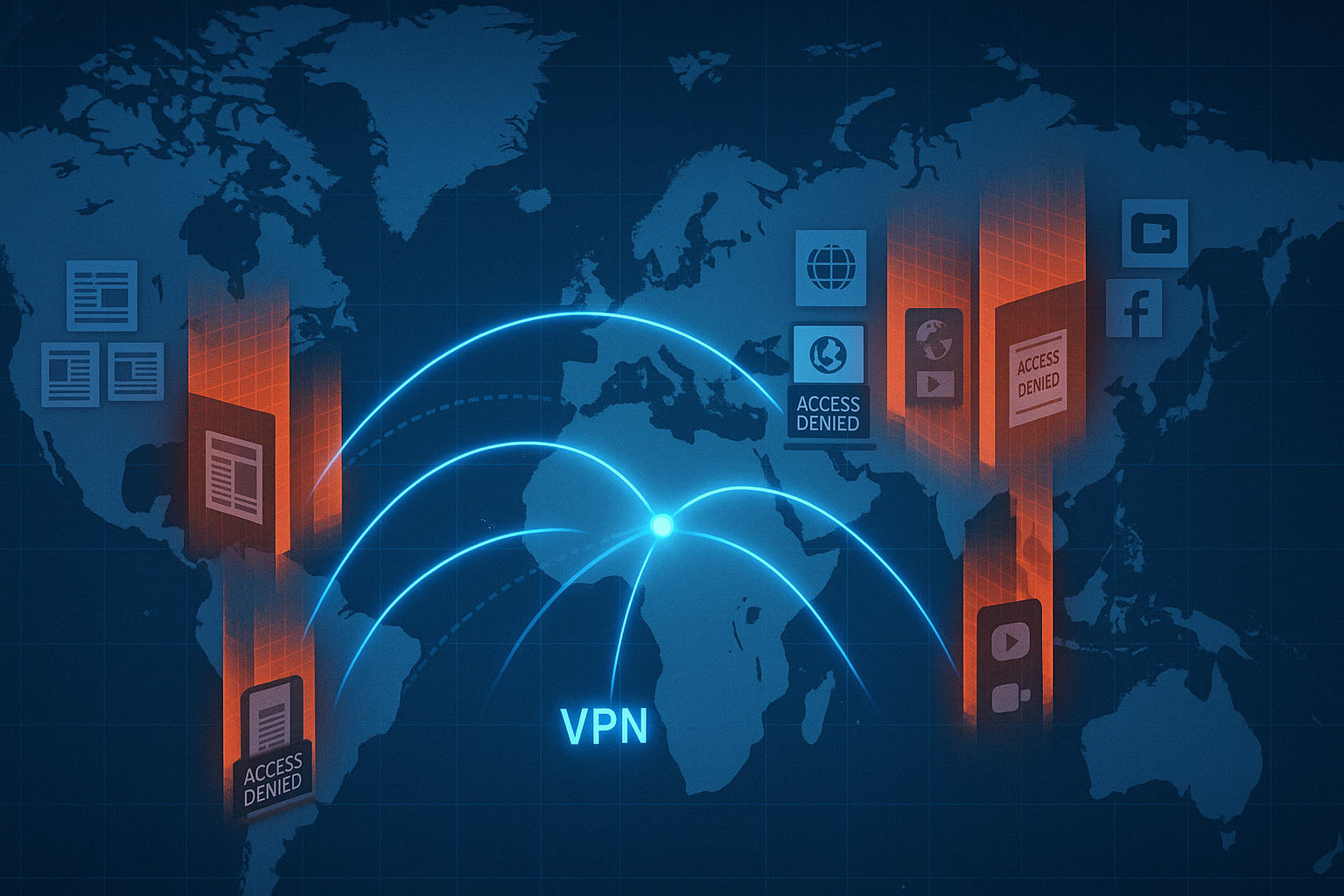In recent years, independent journalists and community voices across the world have found their work disappearing behind digital walls. Articles once shared freely on social platforms are suddenly unreachable to their own audiences. A decade ago, such silencing required the force of a printing press ban or the seizure of broadcast equipment. Today, it can be achieved with a few lines of code at the level of internet service providers.
Their stories are not rare. From Moscow to Tehran to Ankara, millions wake up each morning to a curated version of the internet—where entire newspapers vanish, platforms are throttled, and words are filtered before they ever reach an audience. The digital age promised borderless communication. Instead, it has created new frontiers of censorship and surveillance.
![]()
The New Borders of the Internet
The internet was designed to be open. But in practice, governments and corporations have learned to control what we see and how we interact.
- Censorship: National firewalls regulate speech in countries from China to Turkey, deciding what is visible and what is erased. In 2023 alone, more than 40 countries introduced or strengthened digital restrictions, according to Freedom House.
- Surveillance: From state-level monitoring to corporate data collection, our clicks and keystrokes feed into databases that track identities more closely than any passport system. What you search at midnight may determine what ads—or even investigations—you encounter by morning.
- Cybercrime: With remote work and cloud dependence, attacks on unprotected networks have grown at an unprecedented rate—leaving billions exposed. Ransomware alone inflicted damages estimated at $30 billion globally last year.
These developments have reshaped the global digital landscape into one of invisible borders: who can access which truths, and who remains locked out.
VPNs as Digital Passports
In this environment, Virtual Private Networks (VPNs) have evolved from a niche security tool into a critical infrastructure for freedom.
A VPN does more than encrypt traffic. It acts as a digital passport, granting safe passage through blocked corridors of the internet. For citizens in countries with heavy censorship, VPNs are lifelines to independent journalism, enabling access to platforms like The New York Times, BBC, or even local outlets that would otherwise be unreachable.
For everyday users, VPNs shield online behavior from the gaze of advertisers, hackers, and even unsecured Wi-Fi hotspots at airports or cafés. It’s a matter of basic dignity: you wouldn’t shout your personal letters across a crowded room—so why broadcast your browsing habits across an open network?
The Bigger Picture: Cybersecurity and Trust
The value of VPNs is not limited to censorship circumvention. They are a frontline defense in the broader ecosystem of cybersecurity.
- Encryption as a baseline: VPNs ensure that even if data is intercepted, it remains unreadable.
- Layered security: Combined with multi-factor authentication and zero-trust architectures, VPNs form part of a modern defensive shield.
- Guardrails for the future: As AI-driven surveillance expands and deepfake disinformation erodes public trust, tools that protect identity and authenticity will be indispensable.
VPNs represent more than convenience; they are part of a global trust system. And without trust, the internet collapses into a battleground of manipulation.
More Than Privacy: Protecting Intellectual Freedom
What is truly at stake is intellectual freedom. When individuals lose the ability to explore information freely, society loses its ability to debate, innovate, and evolve.

Consider the role VPNs played during the 2022 Iranian protests, where citizens relied on them to share footage with the outside world. Or the way students in restricted regions use VPNs to access online courses, ensuring that learning transcends politics. These are not just technical use cases—they are acts of resilience.
For inkl’s global readership—who seek balanced, reliable reporting beyond clickbait—this is not an abstract issue. It is the foundation of access to knowledge. VPNs ensure that journalism can continue to cross borders, reaching readers wherever they are.
Closing Reflection
The battle for the internet is not just about hackers vs. firewalls or governments vs. dissidents. It is about the basic question:
Will technology lock us in, or unlock the world for us?
VPNs do not answer this question alone. But they are a vital part of the toolkit that keeps the web open, human, and trustworthy. In an age of invisible borders, they remind us that freedom is not given—it must be encrypted, routed, and defended every day.







